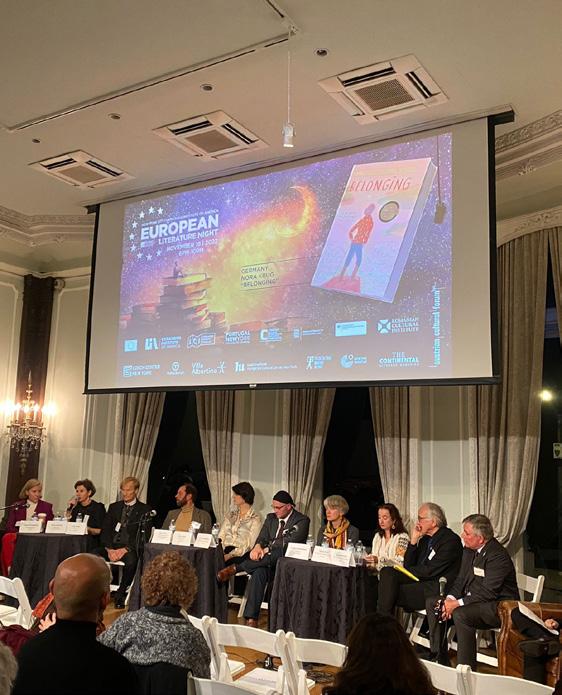
2 minute read
MILAN
Blanka N Vratov Director
After a long time affected by the pandemic restrictions, the events organized by the Czech Centre Munich were a refreshing return to cultural life. The focus was on literary, musical and exhibition projects as well as discussions. The main topics of Czech-German relations in the European context included primarily the war in Ukraine, better knowledge of the neighbouring countries and teaching the Czech language in the Bavarian border regions.
Advertisement
We started the Presidency with the first ever live event of the Munich EUNIC cluster “The Literature Night” entitled “Europe in Original”. The works were read in the original language. Together with the Czech writer Dora Kaprálová and guests invited by four other cultural institutes, the event presented the Ukrainian writer Lyubov Yakimchuk and beginning authors form Munich who applied in an open call.
In September and October, we presented the “Europe as a Task” exhibition at the Academy for Political Education in Tutzing. This venue also hosted a two-day conference on contemporary Czech-German relations in the European context accompanied by a successful exhibition of photographs and ideas of Václav Havel. After all, Havel’s legacy was the starting point of a workshop held within the “The Václav Havel European Dialogues” intended for secondary school students. More than a hundred young people addressed topical issues, including the environment and fake news. The discussion was hosted by a 19-year-old student of political science, climate activist and German UN Youth delegate Joshua Steib, who together with the guests managed to create an impressive and friendly atmosphere in the historic meeting room of the Old Town Hall in Munich. During the debate, the audience asked one question after another. The meeting with Joshua Steib will remain one of the most positive memories of the Presidency events in Munich.
Miroslav Konvalina Director
To mark the Czech EU Presidency, the Czech Center New York team organized events that brought European culture to the US and promoted openness to dialogue. We invited prominent personalities to participate in our projects across the US and offered programmes intended for diverse audiences. Highlights included “The European Literature Night”, the international conference “Havel and Our Crisis” and the exhibition “SDGs: Innovations for a Sustainable Future”.
After several covid-impacted years, the US audiences were excited to be able to attend live events and explore Václav Havel’s ideas in new contexts. We welcomed Professor Milan Babík’s idea to organize a Havel-focused conference at Colby College, Maine. Leading experts from the US and Europe, such as Timothy Snyder, Marci Shore, Paul Wilson, Michael Žantovský, Jacques Rupnik and Martin C. Putna, gathered in the auditorium to speak to students and academics.
The main theme of the conference organized in cooperation with the Václav Havel Library was the current crisis of values, freedom, democracy and peace. The speakers focused on various issues that threaten the sustainability of a free civil society, particularly the crisis of language, the crisis of truth and the crisis of kindness, while also seeking answers to existing challenges, such as inequality, injustice, the suppression of civil liberties and the abuse of the democratic order as such.
The Havel conference was followed by “The European Literature Night” in New York. The annual celebration of contemporary European literature, jointly organized by the Czech Center New York and EUNIC New York and this time also by the Ukrainian Institute of America featured 11 European authors. The event offered a series of live readings and discussions with the authors. The main panel discussion “Peace and Literature” was hosted by Andrew Singer from the Trafika Europe Radio.
The third project, the “SDGs: Innovations for a Sustainable Future” exhibition, highlighted the seventeen Sustainable Development Goals as seen by scientists and research institutes and emphasized the role of innovations in creating a sustainable future for us all. We will continue to return to these themes in 2023.







